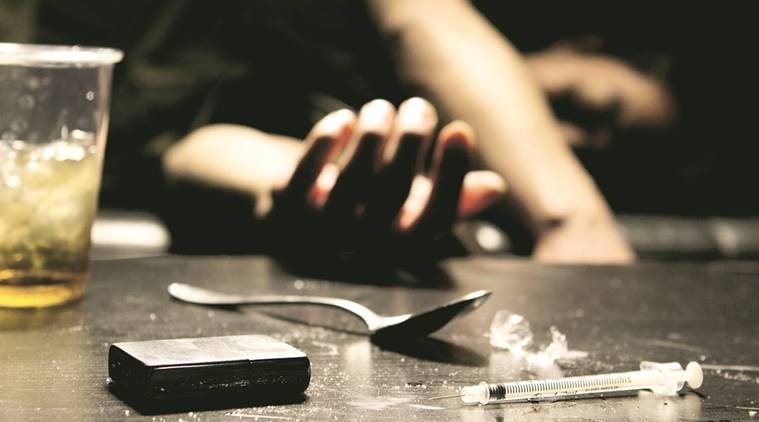 Research quoted in the policy document states that legal substances such as alcohol and tobacco contribute significantly to deaths resulting from substance abuse. (Representational)
Research quoted in the policy document states that legal substances such as alcohol and tobacco contribute significantly to deaths resulting from substance abuse. (Representational)
AMIDST steep rise in “physical, mental and substance-use disorders over the past two decades”, Jammu and Kashmir is set to adopt its first drug de-addiction policy.
As per a draft policy document, studies conducted in recent years have shown an “alarming” shift in the pattern of substance use in the state, in terms of the rise in the number of women users, decreasing age at first-use, increasing use of solvents and injectable opiates, as well as rising drug-related deaths.
Prepared by the Institute Of Mental Health and Neurosciences (IMHANS), Kashmir, J&K State Aids Control Society and the Directorate of Health, the policy has been placed in the public domain to invite suggestions from civil society. “This process has been given a month. After the feedback comes in, we will make the changes required and the policy will be sent for approval and become effective,” Principal Secretary, Health, J&K, Atal Dullo told The Sunday Express.
Research quoted in the policy document states that legal substances such as alcohol and tobacco contribute significantly to deaths resulting from substance abuse. A recent study conducted by IMHANS found that over two-third of the patients included in the study had started substance abuse in the age group of 11-20 years.
The most commonly used substances were nicotine (used by 94.4 per cent of those studied), medicinal opioids (65.7 per cent), cannabis (63.6 per cent), benzodiazepines (45.5 per cent), other prescription medications (43.4 per cent), alcohol (32.5 per cent), inhalants (11.1 per cent), and cocaine (7.5 per cent).
Multi-substance abuse was found in 91.9 per cent of the studied patients. Inhalant use was seen predominantly among adolescents whereas nicotine, cannabis, alcohol, opioids, and benzodiazepines were more pre-dominant in the age group of 21 to 30 years.
Health professionals involved in the writing of the document said that while in the early 1990s IMHANS admitted not more than 100-200 cases of drug abuse annually, over the past three years, this had grown close to 6,000 patients per year.
The policy seeks to address drug abuse through a three-pronged approach, of prevention, integration and rehabilitation. “Several departments of the government, not just heath, but also education, police, excise and others, will have to work in coordination to contain the problem. We have to prevent people from slipping into drug use, but also, the treatment of addiction cannot be stigmatised. Post treatment, we are looking at livelihood options for patients,” Dullo said.
The policy also seeks to strengthen existing laws and to introduce new ones for increasing restrictions on the production and sale of illicit substances as well as to provide effective treatment of mental health problems. Untreated mental illnesses are known risk factors for substance use disorders.
It also attempts to involve faith-based organisations and schools in teaching families of children with high-risk behaviours the role of parental monitoring and family support, besides raising awareness and ensuring training for health care providers at primary, secondary and tertiary-care levels to deliver basic de-addiction and counselling services.
Restricting availability of drugs is also a key factor in the policy. “Laws are needed for restricting sale of solvent-containing compounds, especially to minors,” and “more restriction is required on the sale and public use of legal drugs tobacco and alcohol, especially under-age sale”, says the document.